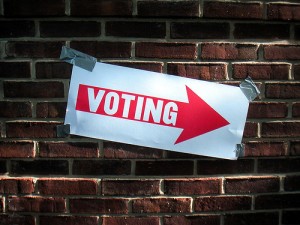
As brand-new Iowa transplants with our first landline, we both have to admit to being a bit giddy at our new-found status as coveted “swing state voters,” who happily give our time and opinions to nearly every pollster who seeks us out. So, we should admit to a bit of bias toward civic engagement. However, we believe that bias to be soundly rooted in our understanding of the teachings of the New Testament and the witness of faith traditions like the Church of the Brethren. It is this understanding that compels us to push back on our fellow Iowan’s argument for a “virtuous abstinence” from the political process, in favor of an even-handed, if thorough, engagement more akin to Yoder’s call to bring a Biblical realism to the ballot box.
It is true that our nation is currently overrun with ugly political partisanship and disgusting abuses of power and wealth. Furthermore, neither of the two major party candidates can be said to be adherents to our understanding of a Brethren peace witness. However, in a world that is estranged from the perfection and wholeness of God, Christians must make choices everyday between the lesser of evils in an effort to bring peace to God’s creation and to live lives that are pleasing to God.
Furthermore, both Brethren and Mennonites, as members of churches with Anabaptist heritage, take the responsibility of community seriously. In our understanding, this responsibility extends beyond the walls of the church and into our neighborhoods. Just as it is the personal responsibility of a good church member to read and interpret the Bible for themselves within community and then to struggle with that community to come to the best understanding of how to follow Christ, so it is the personal responsibility of a Christian living within a democracy to digest the positions of candidates and to struggle with their neighbors on a local and national level to find the best way to govern our living in order to seek the justice and welfare of all citizens.
While this commitment to community is a clear call for us all in our lives of discipleship, it is not without parabolic tension. Two excellent scriptures from the New Testament that draw out the parabolic in Christian engagement with the broader world are seen in Romans 13 and Revelation 13. Probably the more familiar for our dissident traditions and heritage would be the dramatic warnings of Revelation 13. The writer recounts the visions of the beast and monster that symbolize the worldly powers of the contemporary empires of the Ancient Near East. The writer lays out clear cases for how authority is abused and used for evil, and the dire consequences for worshiping the powers of this world. On the other hand, Paul’s letter to the churches in Rome instructs his listeners to see “the authorities [as] God’s servants” and to “Pay to all what is due to them—taxes to whom taxes are due, revenue to whom revenue is due, respect to whom respect is due, honor to whom honor is due” (Rom 12:6-7). Paul’s metaphor of the transaction seems to empower his listeners to a more expansive view of engagement. Further than simply paying taxes, Paul challenges his listeners to give their various resources to the state in ways that are required. Today, living in a different kind of empire based in a democratic model it seems to follow that our responsibilities ought to then include paying the vote when it is due.
This tension lends itself well to Yoder’s idea of a Biblical realism regarding elections, and calls Christians to an uncommon engagement with the civic process. Rather than becoming anxiety-ridden poll-watchers or withdrawn skeptics, we would do well to indeed pay the vote that is “due” today with a level of faithful detachment, remembering that we ought to “expect more (relative) effect, witness and power-for-change, from the non-electoral modes of presence than from the franchise” (Yoder as quoted by Gumm). For we know that no matter the outcome of the election, on Wednesday we will still live in a blessed and broken world, and that fulfilling our civic responsibility is only the beginning of an uncommon Christian witness. Therefore, while Gumm’s points about the downfalls of over-investment in the election process are well taken, we feel it is still imperative for uncommon disciples like Church of the Brethren folks to engage in the democratic struggle.

Katie and Parker are 2012 graduates of Bethany Theological Seminary. They are now the co-pastors of the Ivester Church of the Brethren.

